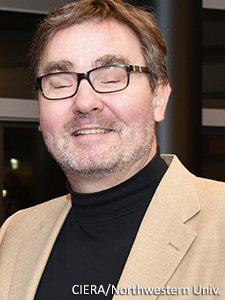AAS Members, Including ApJL Editor, Named AAAS Fellows

Richard Fienberg Running Hare Observatory
This post is adapted from a press release:
 The American Association for the Advancement of Science (AAAS) has bestowed upon 416 of its members the lifetime honor of being an elected Fellow in recognition of their extraordinary accomplishments that include pioneering research, leadership within their field, teaching and mentoring, fostering collaborations, and advancing public understanding of science.
The American Association for the Advancement of Science (AAAS) has bestowed upon 416 of its members the lifetime honor of being an elected Fellow in recognition of their extraordinary accomplishments that include pioneering research, leadership within their field, teaching and mentoring, fostering collaborations, and advancing public understanding of science.
The new Fellows will be recognized at the 2019 AAAS Annual Meeting in Washington, DC. During a Fellows Forum on 16 February, they will be presented with an official certificate and the AAAS Fellows' gold and blue rosette pin, the colors of which represent the fields of science and engineering, respectively.
Among the newly elected AAAS Fellows are eight AAS members:
- Jeffrey Bennett, Big Kid Science
- Eric J. Chaisson, Harvard University
- Jacqueline N. Hewitt, Massachusetts Institute of Technology
- Michael A. Janssen, Jet Propulsion Laboratory, California Institute of Technology
- William D. Langer, Jet Propulsion Laboratory, California Institute of Technology
- Frederic A. Rasio, Northwestern University
- David H. Reitze, California Institute of Technology/University of Florida
- Massimo Stiavelli, Space Telescope Science Institute
Congratulations, all! (If you’re on the list of new AAAS Fellows for 2018 and we overlooked you, please send me an email so I can add your name here.)
 Particularly notable on the list of new AAAS Fellows is Fred Rasio, Editor of The Astrophysical Journal Letters (ApJL), published by the AAS. "Fred has served for many years as a visionary leader for one of the most important journals in the astronomical sciences," says AAS Executive Officer Kevin B. Marvel. "Under his leadership ApJL's impact factor has leaped ahead by a full unit, cementing the journal's position as the most important venue for rapid dissemination of important research results in our field. I am not surprised that he has received this honor from the AAAS."
Particularly notable on the list of new AAAS Fellows is Fred Rasio, Editor of The Astrophysical Journal Letters (ApJL), published by the AAS. "Fred has served for many years as a visionary leader for one of the most important journals in the astronomical sciences," says AAS Executive Officer Kevin B. Marvel. "Under his leadership ApJL's impact factor has leaped ahead by a full unit, cementing the journal's position as the most important venue for rapid dissemination of important research results in our field. I am not surprised that he has received this honor from the AAAS."
"In his role as ApJ Letters Editor, Fred has been a fearless and passionate defender of science," adds AAS President Megan Donahue (Michigan State University). "We are extremely proud of the AAAS's recognition of his contributions to the field of astronomy and to the communication of science."
The AAAS's annual tradition of recognizing leading scientists as Fellows dates to 1874. Since then, the AAAS has honored distinguished scientists such as astronomer Maria Mitchell, elected a Fellow in 1875; inventor Thomas Edison (1878); chemist Linus Pauling (1939); and computer scientist Grace Hopper (1963). Four of the 2018 Nobel Prize laureates — James Allison, Arthur Ashkin, Frances Arnold, and George Smith — are AAAS elected Fellows.
Fellows may be nominated in several ways. A nomination can be put forth by three previously elected Fellows who are current AAAS members; two must have no affiliation with the nominee's institution. Nominees also may be nominated by the AAAS's chief executive officer or by the steering group of one of the AAAS's 24 sections. All nominees must have been a member of the AAAS for four years by the end of the calendar year of their election. Nominations go through a two-step review process, with the relevant steering group reviewing nominations in their section and the AAAS Council — the organization's member-elected governing body — voting on the final list.

